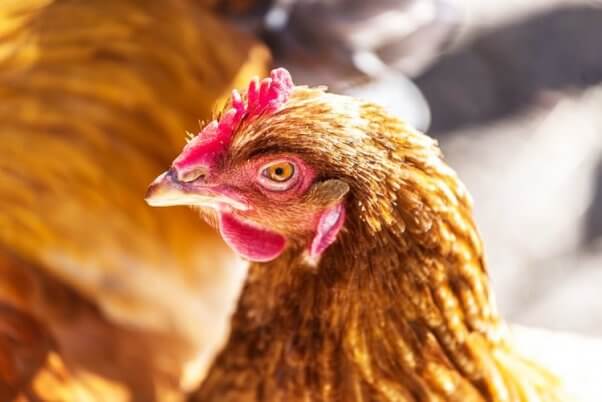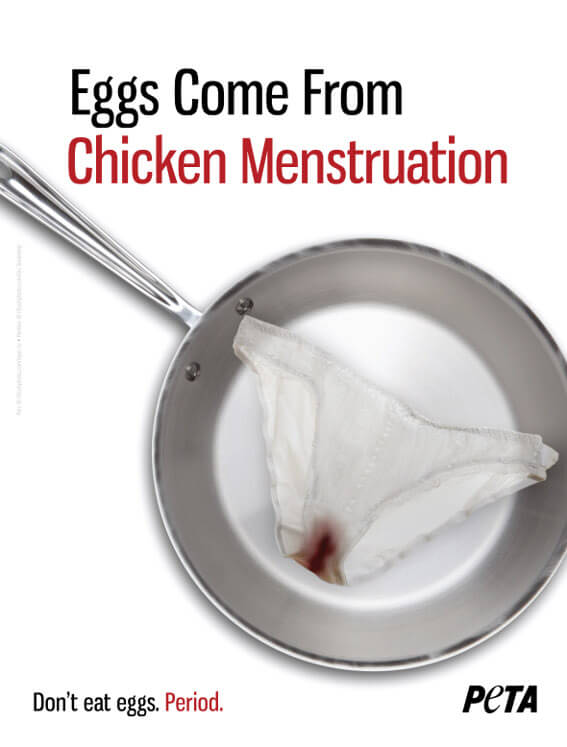If you think that raising “backyard chickens” and stealing their eggs is somehow less speciesist than buying eggs from Whole Foods that come from so-called “free-range” egg farms like Nellie’s, we’ve got some news: Chickens aren’t here to satisfy your egg fetish, no matter what.

Chances are that if you’re curious about “backyard chickens,” your heart’s in the right place. However, we should all show birds real kindness by leaving them and their eggs (say it with us: “their eggs”) the heck alone. So before you start building that chicken coop, ask yourself these five things:
-
Buying ‘Backyard Chickens’ v. Rescuing Them
If you’re buying chickens from hatcheries (which ship day-old chicks via USPS—sometimes fatally) or stores like Tractor Supply (which get the chicks they sell from the aforementioned hatcheries), you’re still supporting the cruel egg industry. Just like those used by Nellie’s and similar operations, the chickens you’d be buying have been bred to have “desirable” egg-laying traits—despite the negative effects that selective breeding for maximum egg laying can have on their health. What’s more, you’re funding an industry that tosses out sickly chicks (ones it can’t exploit), leaves them to die, and grinds up male chicks while they’re still alive. (All American hatcheries kill male chicks.)
Right about now, you’re probably thinking, “Fine, I’ll rescue chickens then”—which would be admirable, if you weren’t planning to steal and eat their eggs. (Scroll to point number five.)
-
Chickens Fall Ill, Get Injured, and Stop Laying Eggs—Then What?
If your canine or feline companion requires medical attention, you visit your local veterinarian. Chickens, though, require specialized veterinary care—something that many veterinarians (who are used to working with dogs and cats) won’t be able to provide, and those who can are likely to be prohibitively costly.
Then there’s what happens when hens stop laying eggs—something they do for only a fraction of their lives. It’s horribly common for these birds to be dropped off at animal shelters or abandoned in the woods by people—fully displaying their speciesism—who don’t want to spend any more time or money on an animal they’re no longer able to exploit.
-
Be Better Than the Egg Industry
When left alone in nature, red jungle fowl lay about 10 to 15 eggs a year, and they—like all birds—lay eggs only during a particular breeding season. But “laying hens” (those who were bred from the red jungle fowl) have been manipulated—both genetically and situationally—to lay many more eggs in a single year, sometimes more than 300. Using hens in this way depletes them of vital nutrients, leading to vitamin deficiencies and sometimes emaciation. For some breeds, the stress on their reproductive system can be fatal. Raising chickens in your backyard and stealing their eggs comes from the same speciesist notion that makes the egg industry go round—that chickens need to provide us with something in order to be worthy of our concern.

Caring for chicken companions without exploiting them for food typically means collecting their eggs and feeding them back to the birds, boiled or scrambled, along with the shells—this helps replenish vital nutrients that chickens lose from laying so often and will drastically improve the quality and duration of their lives. A responsible and considerate guardian should also consider contraception (medical therapy in the form of a hormone implant placed underneath birds’ skin) for hens who are most susceptible to reproductive issues.
-
Eggs Drive More Than Chickens to an Early Grave
Now you can be a little selfish—consider your own body and what eating eggs does to it. Eggs are full of cholesterol, and as researchers have found, eating them increases your chances of developing heart disease and dying early. Not to mention …
-
You’ve Heard of Speciesism, Right?
Remember: You can’t steal hens’ eggs and still be righteous, because eggs are not food for humans. It’ll always be speciesist to take something from an animal (regardless of whether you rescued them or not) and eat it … or wear it or use it in any way. Hens—who begin to teach their chicks clucks and chirps before they even hatch—aren’t commodities or egg-producing machines: Their eggs are for them, not for us. You wouldn’t adopt a dog and expect them to produce something for you to eat, wear, or otherwise use, right? Then don’t show chickens any less respect.
Repeat after us: EGGS. ARE. NOT. OUR. FOOD.
Adopting chickens as companions and giving them refuge from being used or killed is a kind thing to do—but, just as with dogs or cats, it’s only kind if you have the means, knowledge, and compassion that are necessary to be an adequate guardian. (If you live in an area with lots of traffic and noise, your neighborhood could be too stressful an environment for a chicken to live in comfortably.) Committing to being a guardian means caring for your feathered friend(s) for life. So if you really want to give a chicken a “retirement home,” please, adopt—and love them like a companion, not a breakfast service.
Do More to Help Chickens
You don’t need eggs—you need VeganEgg, Scramblit, or any of the other egg-free upgrades that make whipping up a vegan omelet or baking a vegan cake a breeze. If you really want to use your backyard for food, plant a nice vegetable garden—but leave chickens’ menstrual cycles out of it.







